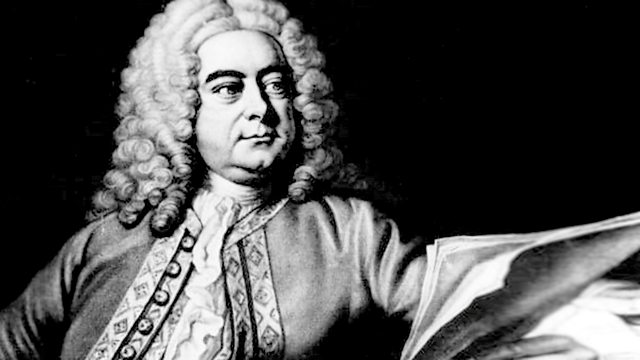
Alexander’s Feast
This week Donald Macleod focuses on Handel the organist. Today, as London audiences lose interest in Italian opera, oratorio - with tailor-made organ concerti - is where it’s at.
This week Donald Macleod focuses on Handel the organist. Today, as London audiences lose interest in Italian opera, oratorio - with tailor-made organ concerti - is where it’s at.
Handel - not just a great composer but an astute businessman too - got into oratorio at precisely the right time. Since the late 1720s, the London public’s appetite for opera in Italian had been on a downward trajectory. Then in 1733, a rival company - the Opera of the Nobility - set itself up in direct competition to Handel, making the Italian-opera pound even harder to earn. Handel’s return to oratorio began with what might have been a one-off revival of a fifteen-year-old work, Esther, to mark his 47th birthday. But when, a couple of months later, a ‘pirate’ performance of the same piece was put on without his permission, Handel recaptured the initiative by quickly mounting a new, substantially revised version. It was a great success, which he followed up first with Acis and Galatea - an English revision of his Italian oratorio Aci, Galatea e Polifemo - and then with a new oratorio, Deborah. From this accidental sequence of events, the English oratorio tradition was born – along with the organ concerto, which Handel introduced to beef up the evening’s entertainment to match the experience of an evening at the opera. In Alexander's Feast, or The Power of Musick, the concerti – for organ and harp – are actually integrated into the narrative.
Cecilia, volgi un sguardo, HWV 89 (No 8, ‘Tra amplessi innocenti’, extract)
Jennifer Smith, soprano
John Elwes, tenor
The English Concert
Trevor Pinnock, conductor
Concerto Grosso in C, HWV 318 (Alexander's Feast)
Collegium Musicum 90
Simon Standage, conductor
Harp Concerto in B flat, Op 4 No 6 (HWV 294)
Frances Kelly, harp
Brandenburg Consort
Roy Goodman, conductor
Alexander's Feast; or, The Power of Musick, HWV 75 (Pt 2, No 25: ‘Thus, long ago, 'ere heaving Bellows learned to blow’)
Anthony Rolfe Johnson, tenor
Stockholm Bach Choir
Concentus Musicus Wien
Nikolaus Harnoncourt, conductor
Organ Concerto in G minor, Op 4 No 1 (HWV 289)
Ton Koopman, organ and direction
Amsterdam Baroque Orchestra
Producer: Chris Barstow
Last on
Music Played
-
![]()
George Frideric Handel
Cecilia, volgi un sguardo (Cecilia, cast a glance)
Singer: Jennifer Smith. Orchestra: The English Concert. Singer: John Elwes. Director: Trevor Pinnock.- ARCHIV : 419-736-2.
- ARCHIV.
- 14.
-
![]()
George Frideric Handel
Concerto grosso in C major HWV.318 (Alexander's feast)
Performer: Simon Standage. Ensemble: Collegium Musicum.- CHANDOS : CHAN-0622.
- CHANDOS.
- 17.
-
![]()
George Frideric Handel
Concerto in B flat major Op.4`6
Performer: Frances Kelly. Orchestra: Brandenburg Consort. Conductor: Roy Goodman.- HYPERION: CDD22052.
- HYPERION.
- 10.
-
![]()
George Frideric Handel
Alexander's feast - Thus, long ago, ere heaving Bellows learned to blow
Singer: Anthony Rolfe Johnson. Ensemble: Concentus Musicus Vienna. Conductor: Nikolaus Harnoncourt.- TELDEC : 8.-35671.
- TELDEC.
- 6.
-
![]()
George Frideric Handel
Organ Concerto in G minor
Performer: Amsterdam Baroque Orchestra. Performer: Ton Koopman. Director: Ton Koopman.- ERATO : 4509-91932-2.
- ERATO.
- 19.
Broadcasts
- Tue 6 Dec 2016 12:00����ý Radio 3
- Tue 6 Dec 2016 18:30����ý Radio 3
- Tue 28 Apr 2020 12:00����ý Radio 3
Beethoven Unleashed – the box set
What was really wrong with Beethoven?
Composers A to Z
Who knew? Five eye-opening stories from Composer of the Week
Five reasons why we love Parry's Jerusalem
What is the strange power of Jerusalem which makes strong men weep?
A man out of time – why Parry's music and ideas were at odds with his image...
The composer of Jerusalem was very far from the conservative figure his image suggests.
Composer Help Page
Find resources and contacts for composers from within the classical music industry.





